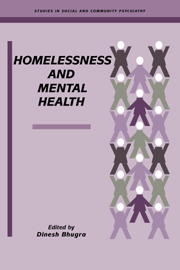Book contents
- Frontmatter
- Contents
- List of contributors
- Preface
- Part I INTRODCTION AND SPECIAL GROUPS
- Part II SERVICES
- Part III INTERNATIONAL PERSPECTIVE
- Part IV POLICY AND EVALUATION
- 15 Implications of social policy
- 16 Evaluating services for homeless people with mental disorders: theoretical and practical issues
- 17 Future directions for homeless mentally ill
- Index
15 - Implications of social policy
from Part IV - POLICY AND EVALUATION
Published online by Cambridge University Press: 15 October 2009
- Frontmatter
- Contents
- List of contributors
- Preface
- Part I INTRODCTION AND SPECIAL GROUPS
- Part II SERVICES
- Part III INTERNATIONAL PERSPECTIVE
- Part IV POLICY AND EVALUATION
- 15 Implications of social policy
- 16 Evaluating services for homeless people with mental disorders: theoretical and practical issues
- 17 Future directions for homeless mentally ill
- Index
Summary
Whilst there may continue to be some disagreement about the precise nature and extent of mental illness amongst homeless people, commentators generally view social and health policy as playing the major part in its causation and consequently it has the potential to alleviate it. Bassuk et al. (1984) have said that explanations for the marked increase in the numbers of homeless people include unemployment and the economic recession, deinstitutionalization of mental patients, unavailability of low-cost housing, reduced disability benefits and cutbacks to social service agencies. Policy developments may be viewed therefore as directly responsible for the increased incidence of mental illness in homeless people. Alternatively, changes occurring in society, for example, the reduction in importance of the extended family and increase in divorce rates, may not have evoked the necessary policy response to minimize adverse effects.
Housing
People with mental illness will be particularly vulnerable to being made homeless. In a competitive market for homes, those with severe and enduring mental illness will be disadvantaged by their lack of employment, disabilities consequent on their illness and stigmatization. Securing accommodation may therefore be difficult and maintaining it equally problematic for much the same reasons. In turn, housing difficulties are life events and circumstances predisposing to relapse and persisting disability. Of particular consequence therefore, has been the availability of low-cost housing in the public or private rental sector. Both areas are known to have reduced over the past decade (recently reviewed comprehensively by Everton, 1993). This has occurred in part because of the encouragement of owner-occupation, now supported in the UK by both major political parties.
- Type
- Chapter
- Information
- Homelessness and Mental Health , pp. 267 - 279Publisher: Cambridge University PressPrint publication year: 1996
- 1
- Cited by

